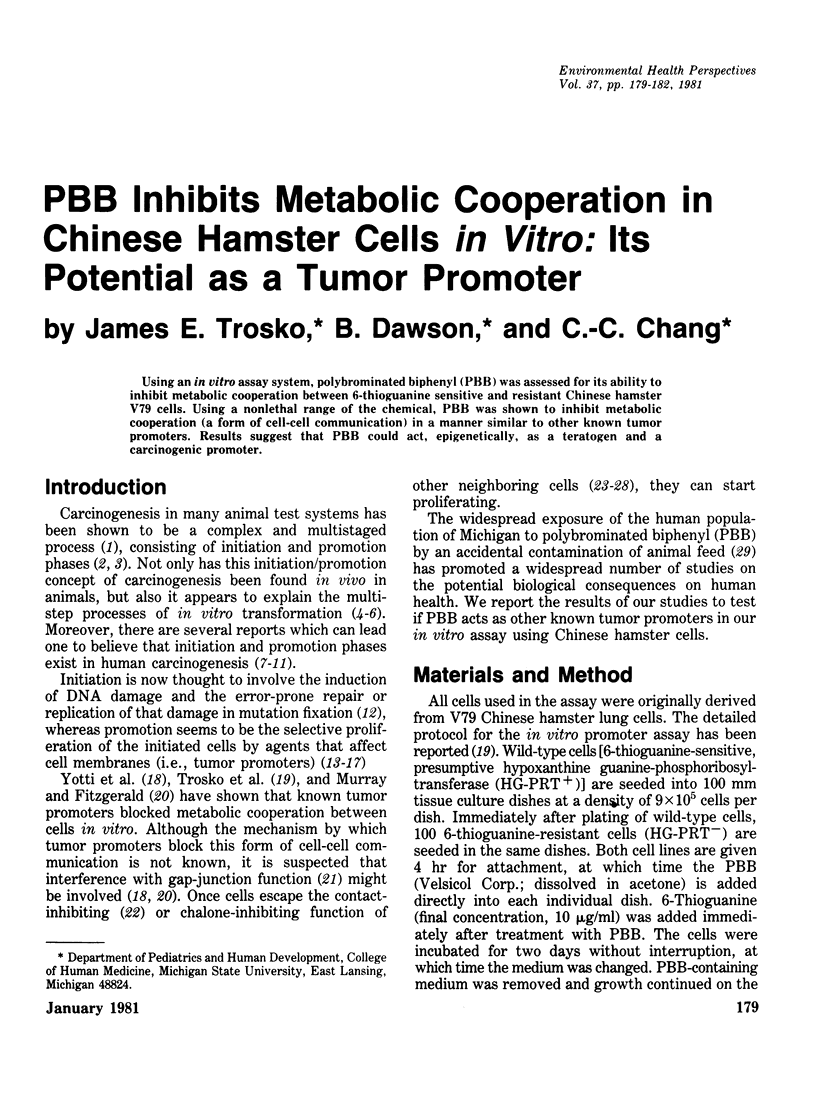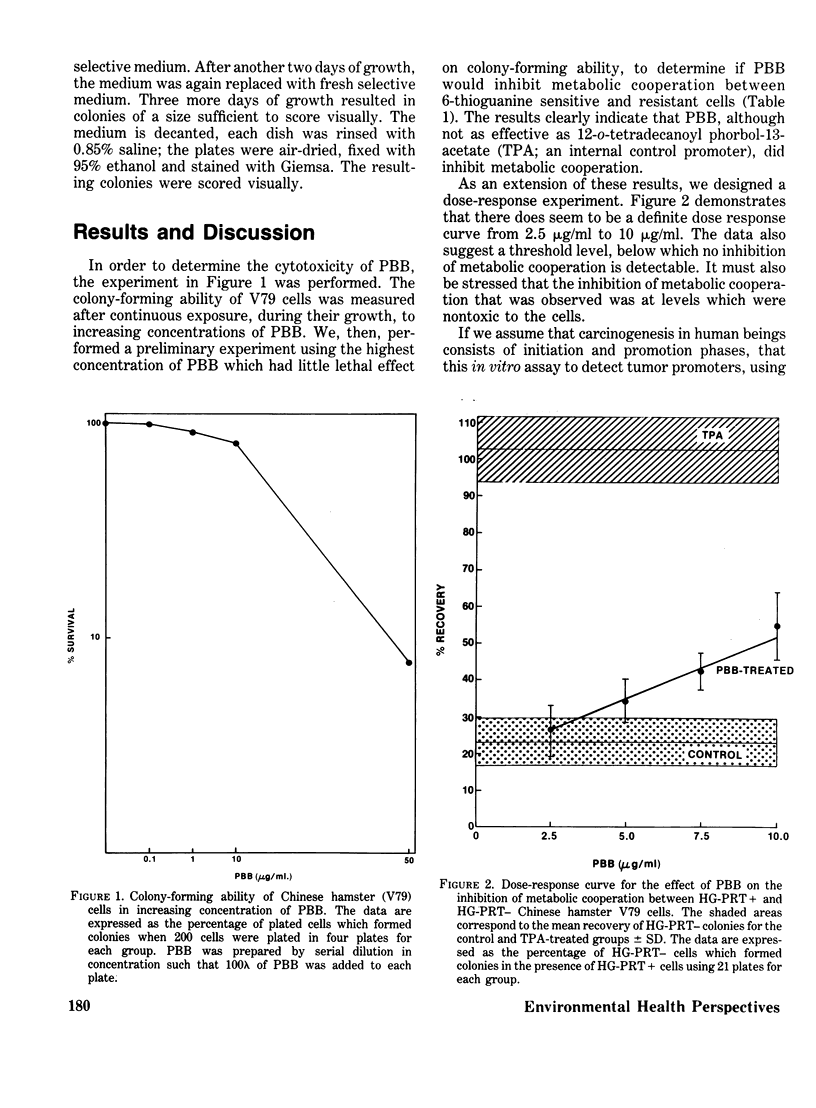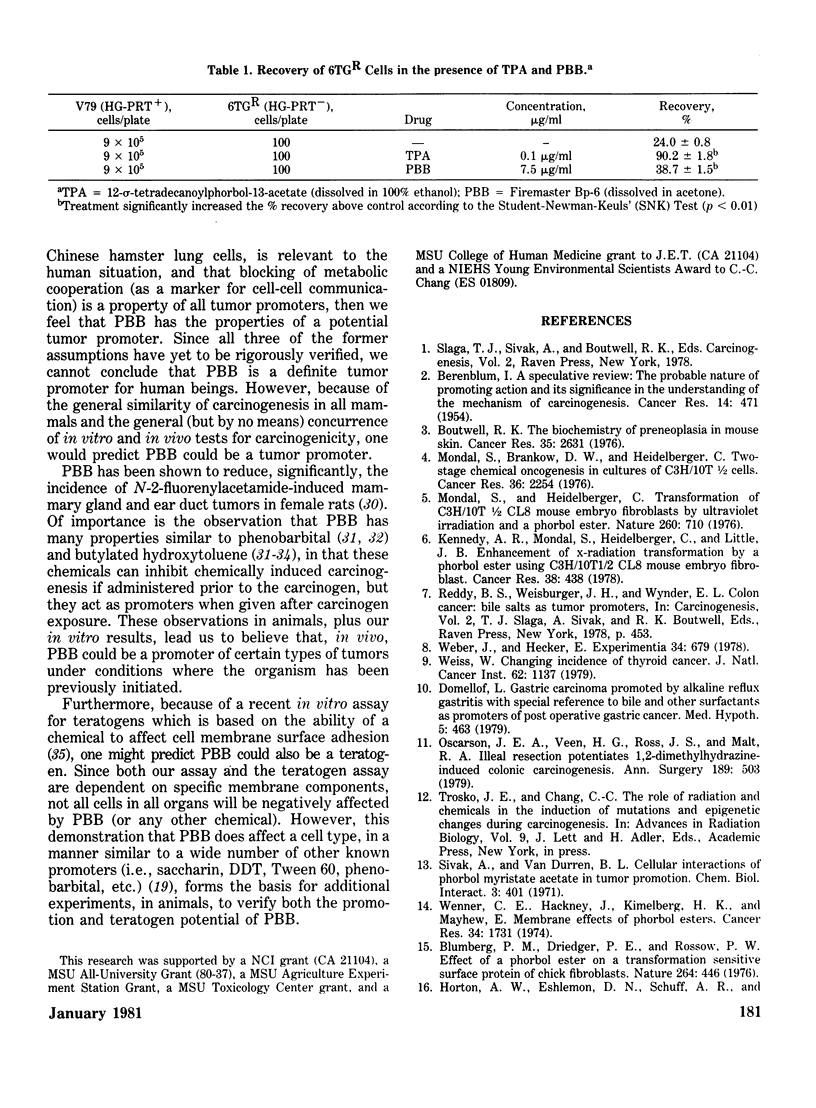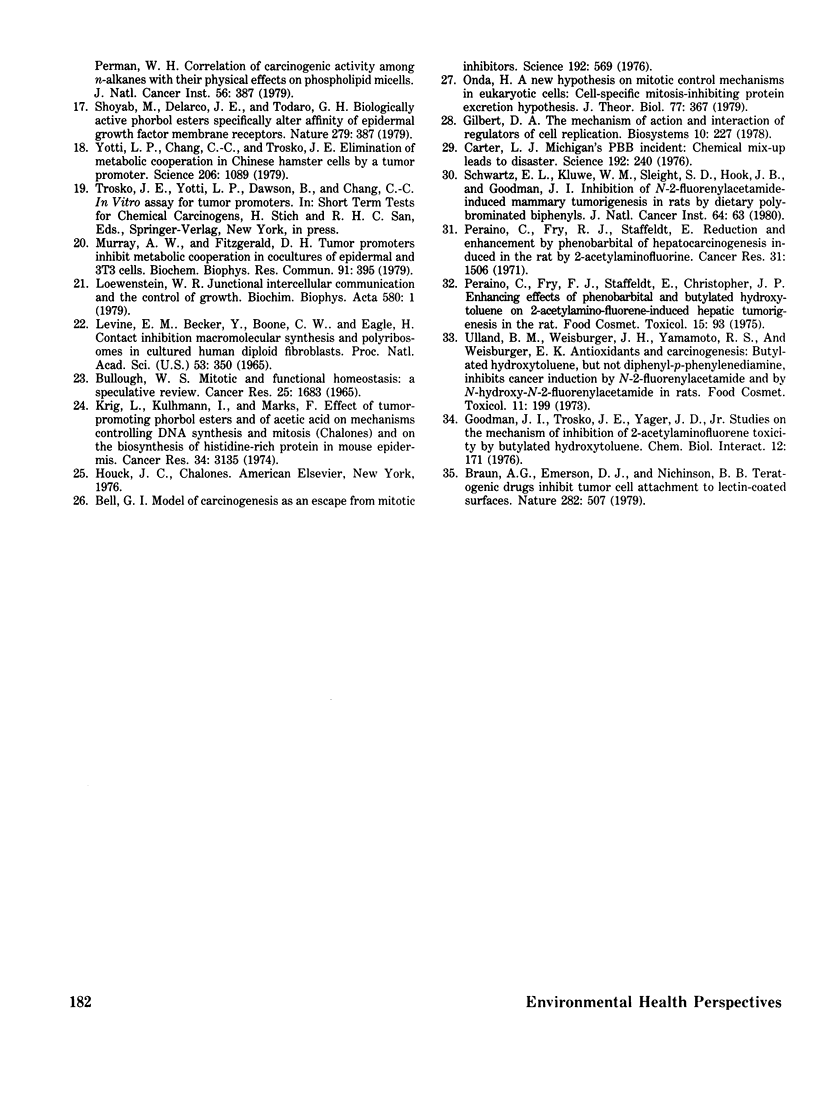Abstract
Using an in vitro assay system, polybrominated biphenyl (PBB) was assessed for its ability to inhibit metabolic cooperation between 6-thioguanine sensitive and resistant Chinese hamster V79 cells. Using a nonlethal range of the chemical, PBB was shown to inhibit metabolic cooperation (a form of cell-cell communication) in a manner similar to other known tumor promoters. Results suggest that PBB could act, epigenetically, as a teratogen and a carcinogenic promoter.
Full text
PDF



Selected References
These references are in PubMed. This may not be the complete list of references from this article.
- BERENBLUM I. A speculative review; the probable nature of promoting action and its significance in the understanding of the mechanism of carcinogenesis. Cancer Res. 1954 Aug;14(7):471–477. [PubMed] [Google Scholar]
- Bell G. I. Models of carcinogenesis as an escape from mitotic inhibitors. Science. 1976 May 7;192(4239):569–572. doi: 10.1126/science.130679. [DOI] [PubMed] [Google Scholar]
- Blumberg P. M., Driedger P. E., Rossow P. W. Effect of a phorbol ester on a transformation-sensitive surface protein of chick fibroblasts. Nature. 1976 Dec 2;264(5585):446–447. doi: 10.1038/264446a0. [DOI] [PubMed] [Google Scholar]
- Boutwell R. K. The biochemistry of preneoplasia in mouse skin. Cancer Res. 1976 Jul;36(7 Pt 2):2631–2635. [PubMed] [Google Scholar]
- Braun A. G., Emerson D. J., Nichinson B. B. Teratogenic drugs inhibit tumour cell attachment to lectin-coated surfaces. Nature. 1979 Nov 29;282(5738):507–509. doi: 10.1038/282507a0. [DOI] [PubMed] [Google Scholar]
- Bullough W. S. Mitotic and functional homeostasis: a speculative review. Cancer Res. 1965 Nov;25(10):1683–1727. [PubMed] [Google Scholar]
- Carter L. J. Michigan's PBB Incident: Chemical Mix-Up Leads to Disaster. Science. 1976 Apr 16;192(4236):240–243. doi: 10.1126/science.192.4236.240. [DOI] [PubMed] [Google Scholar]
- Domellöf L. Gastric carcinoma promoted by alkaline reflux gastritis -- with special reference to bile and other surfactants as promoters of postoperative gastric cancer. Med Hypotheses. 1979 Apr;5(4):463–476. doi: 10.1016/0306-9877(79)90112-9. [DOI] [PubMed] [Google Scholar]
- Gilbert D. A. The mechanism of action and interaction of regulators of cell replication. Biosystems. 1978 Aug;10(3):227–233. doi: 10.1016/0303-2647(78)90003-5. [DOI] [PubMed] [Google Scholar]
- Goodman J. I., Trosko J. E., Yager J. D., Jr Studies on the mechanism of inhibition of 2-acetylaminofluorene toxicity by butylated hydroxytoluene. Chem Biol Interact. 1976 Feb;12(2):171–182. doi: 10.1016/0009-2797(76)90097-1. [DOI] [PubMed] [Google Scholar]
- Horton A. W., Eshleman D. N., Schuff A. R., Perman W. H. Correlation of cocarcinogenic activity among n-alkanes with their physical effects on phospholipid micelles. J Natl Cancer Inst. 1976 Feb;56(2):387–391. doi: 10.1093/jnci/56.2.387. [DOI] [PubMed] [Google Scholar]
- Krieg L., Kühlmann I., Marks F. Effect of tumor-promoting phorbol esters and of acetic acid on mechanisms controlling DNA synthesis and mitosis (Chalones) and on the biosynthesis of histidine-rich protein in mouse epidermis. Cancer Res. 1974 Nov;34(11):3135–3146. [PubMed] [Google Scholar]
- LEVINE E. M., BECKER Y., BOONE C. W., EAGLE H. CONTACT INHIBITION, MACROMOLECULAR SYNTHESIS, AND POLYRIBOSOMES IN CULTURED HUMAN DIPLOID FIBROBLASTS. Proc Natl Acad Sci U S A. 1965 Feb;53:350–356. doi: 10.1073/pnas.53.2.350. [DOI] [PMC free article] [PubMed] [Google Scholar]
- Loewenstein W. R. Junctional intercellular communication and the control of growth. Biochim Biophys Acta. 1979 Feb 4;560(1):1–65. doi: 10.1016/0304-419x(79)90002-7. [DOI] [PubMed] [Google Scholar]
- Mondal S., Brankow D. W., Heidelberger C. Two-stage chemical oncogenesis in cultures of C3H/10T1/2 cells. Cancer Res. 1976 Jul;36(7 Pt 1):2254–2260. [PubMed] [Google Scholar]
- Mondal S., Heidelberger C. Transformation of C3H/10T1/2CL8 mouse embryo fibroblasts by ultraviolet irradiation and a phorbol ester. Nature. 1976 Apr 22;260(5553):710–711. doi: 10.1038/260710a0. [DOI] [PubMed] [Google Scholar]
- Murray A. W., Fitzgerald D. J. Tumor promoters inhibit metabolic cooperation in cocultures of epidermal and 3T3 cells. Biochem Biophys Res Commun. 1979 Nov 28;91(2):395–401. doi: 10.1016/0006-291x(79)91535-3. [DOI] [PubMed] [Google Scholar]
- Onda H. A new hypothesis on mitotic control mechanism in eukaryotic cells: cell-specific mitosis-inhibiting protein excretion hypothesis. J Theor Biol. 1979 Apr 7;77(3):367–377. doi: 10.1016/0022-5193(79)90362-x. [DOI] [PubMed] [Google Scholar]
- Peraino C., Fry R. J., Staffeldt E. Reduction and enhancement by phenobarbital of hepatocarcinogenesis induced in the rat by 2-acetylaminofluorene. Cancer Res. 1971 Oct;31(10):1506–1512. [PubMed] [Google Scholar]
- Schwartz E. L., Kluwe W. M., Sleight S. D., Hook J. B., Goodman J. I. Inhibition of N-2-fluorenylacetamide-induced mammary tumorigenesis in rats by dietary polybrominated biphenyls. J Natl Cancer Inst. 1980 Jan;64(1):63–67. [PubMed] [Google Scholar]
- Shoyab M., De Larco J. E., Todaro G. J. Biologically active phorbol esters specifically alter affinity of epidermal growth factor membrane receptors. Nature. 1979 May 31;279(5712):387–391. doi: 10.1038/279387a0. [DOI] [PubMed] [Google Scholar]
- Sivak A., Van Duuren B. L. Cellular interactions of phorbol myristate acetate in tumor promotion. Chem Biol Interact. 1971 Nov;3(6):401–411. doi: 10.1016/0009-2797(71)90001-9. [DOI] [PubMed] [Google Scholar]
- Ulland B. M., Weisburger J. H., Yamamoto R. S., Weisburger E. K. Antioxidants and carcinogenesis: butylated hydroxytoluene, but not diphenyl-p-phenylenediamine, inhibits cancer induction by N-2-fluorenylacetamide and by N-hydroxy-N-2-fluorenylacetamide in rats. Food Cosmet Toxicol. 1973 Apr;11(2):199–207. doi: 10.1016/s0015-6264(73)80486-9. [DOI] [PubMed] [Google Scholar]
- Weber J., Hecker E. Cocarcinogens of the diterpene ester type from Croton flavens L. and esophageal cancer in Curaçao. Experientia. 1978 Jun 15;34(6):679–682. doi: 10.1007/BF01947253. [DOI] [PubMed] [Google Scholar]
- Weiss W. Changing incidence of thyroid cancer. J Natl Cancer Inst. 1979 May;62(5):1137–1142. [PubMed] [Google Scholar]
- Wenner C. E., Hackney J., Kimelberg H. K., Mayhew E. Membrane effects of phorbol esters. Cancer Res. 1974 Jul;34(7):1731–1737. [PubMed] [Google Scholar]
- Yotti L. P., Chang C. C., Trosko J. E. Elimination of metabolic cooperation in Chinese hamster cells by a tumor promoter. Science. 1979 Nov 30;206(4422):1089–1091. doi: 10.1126/science.493994. [DOI] [PubMed] [Google Scholar]



